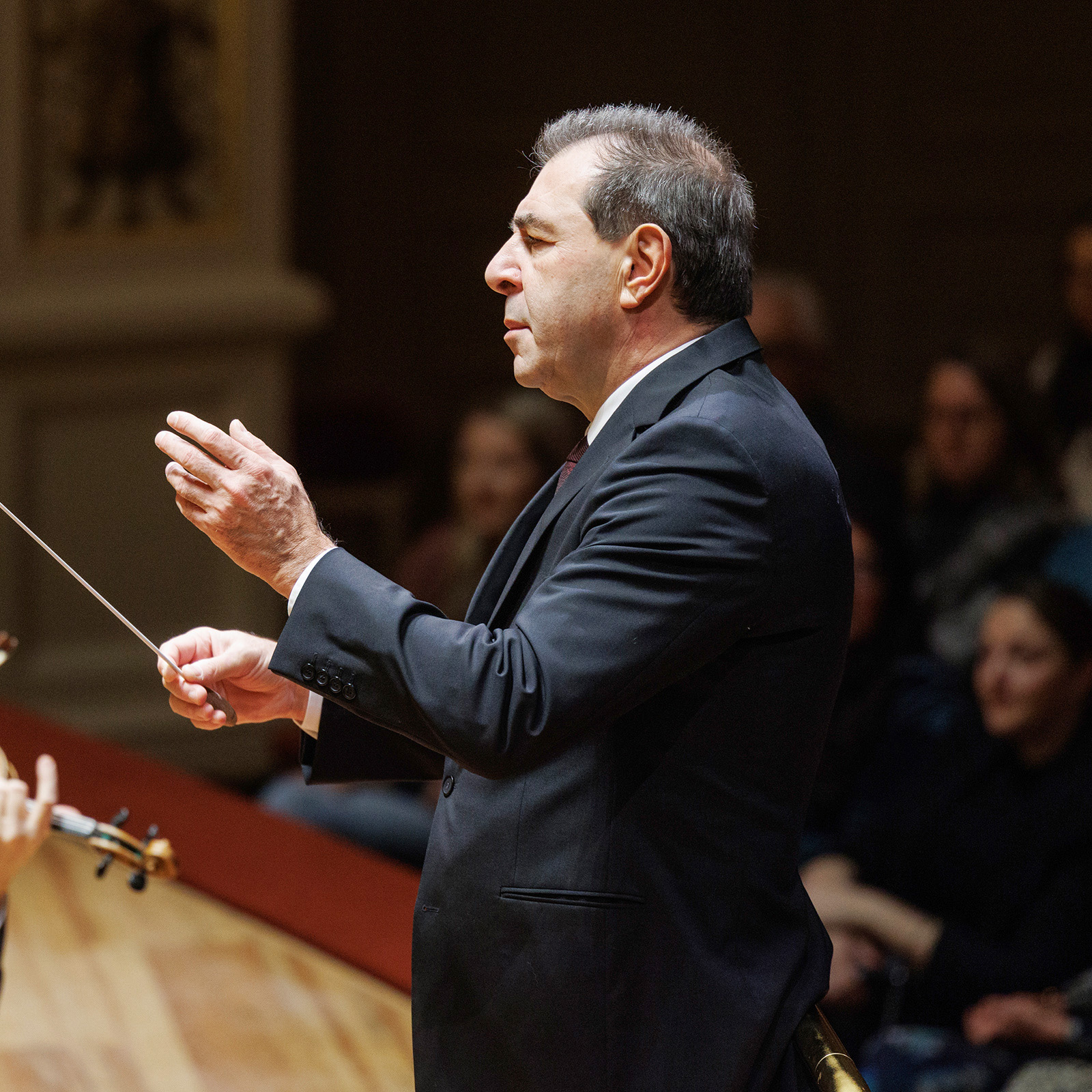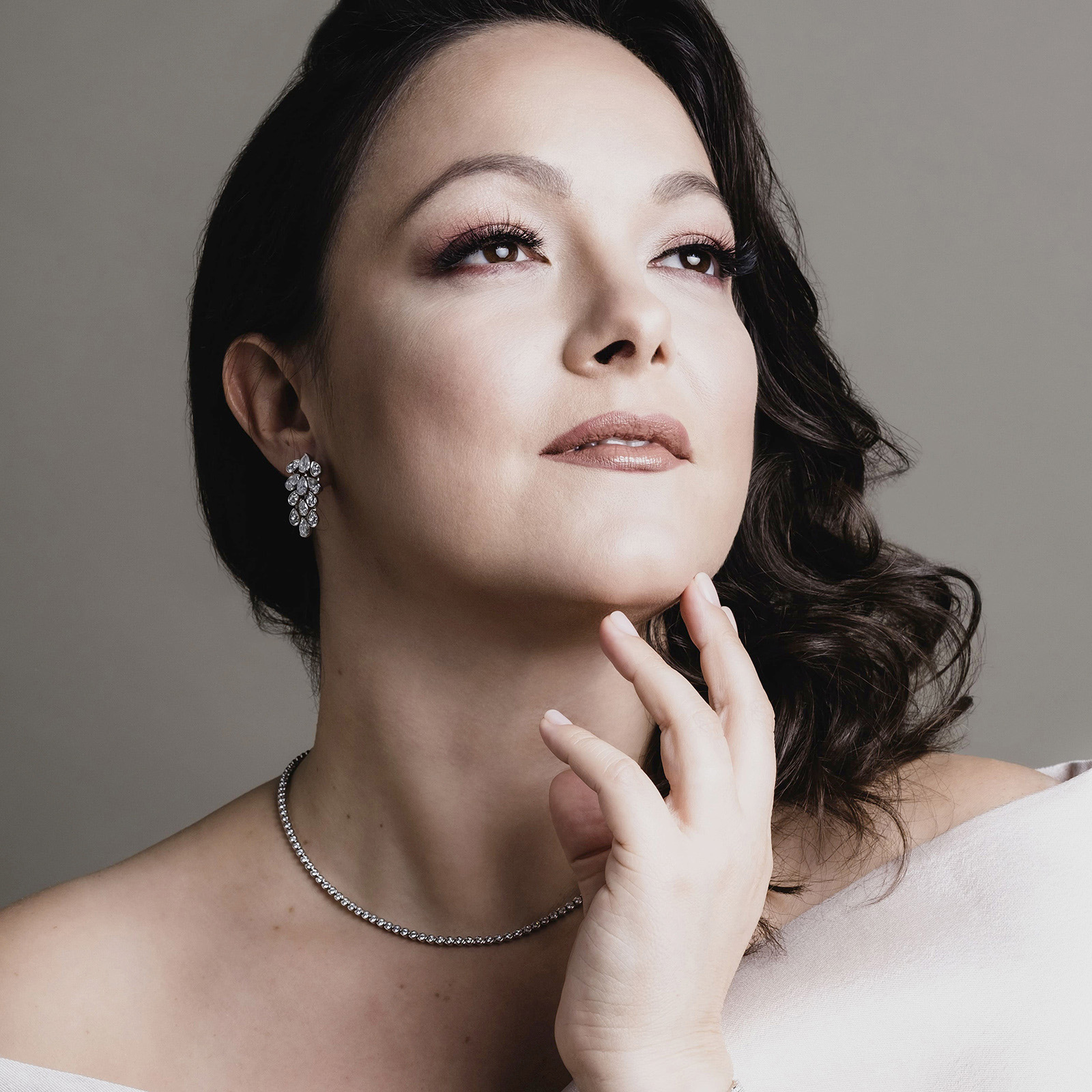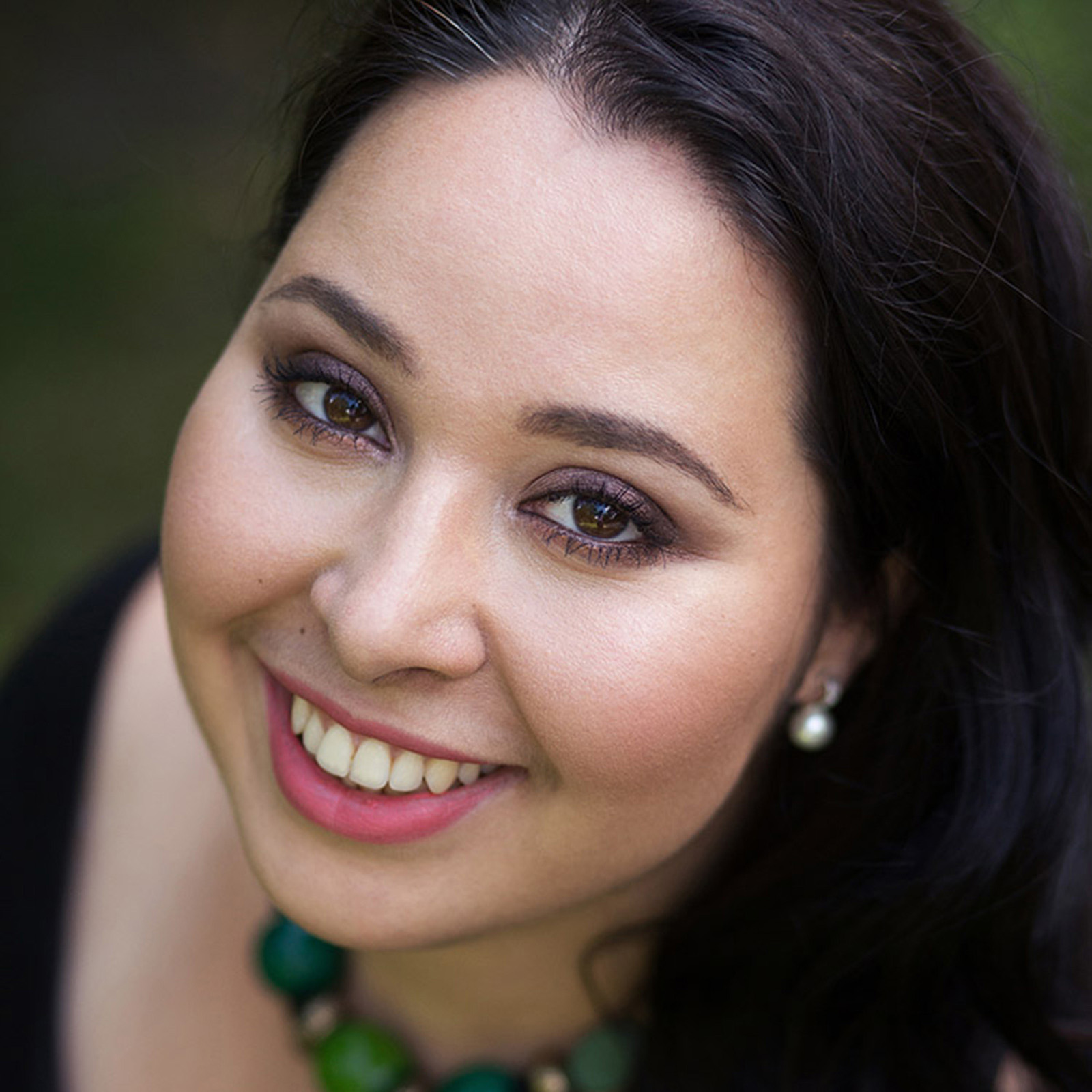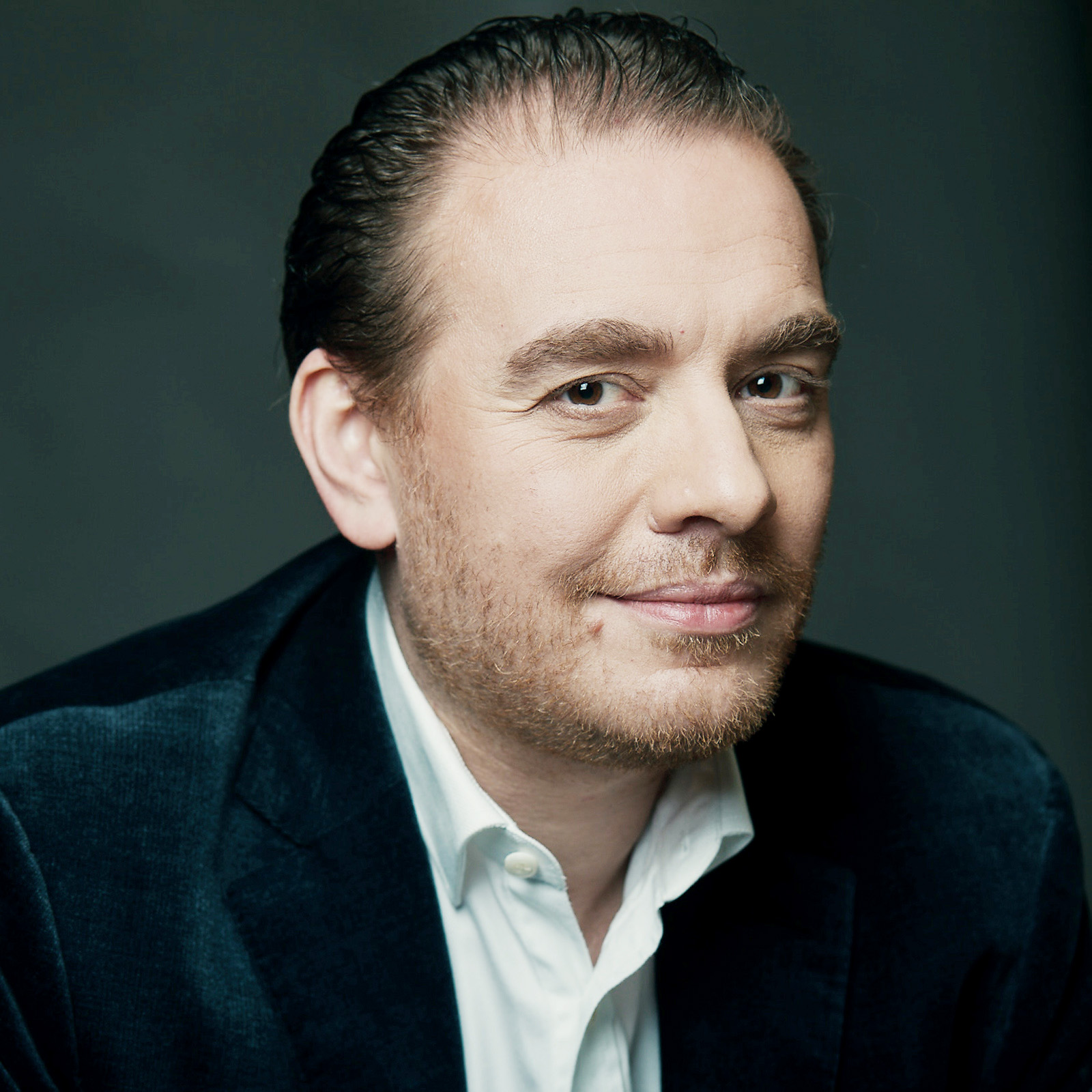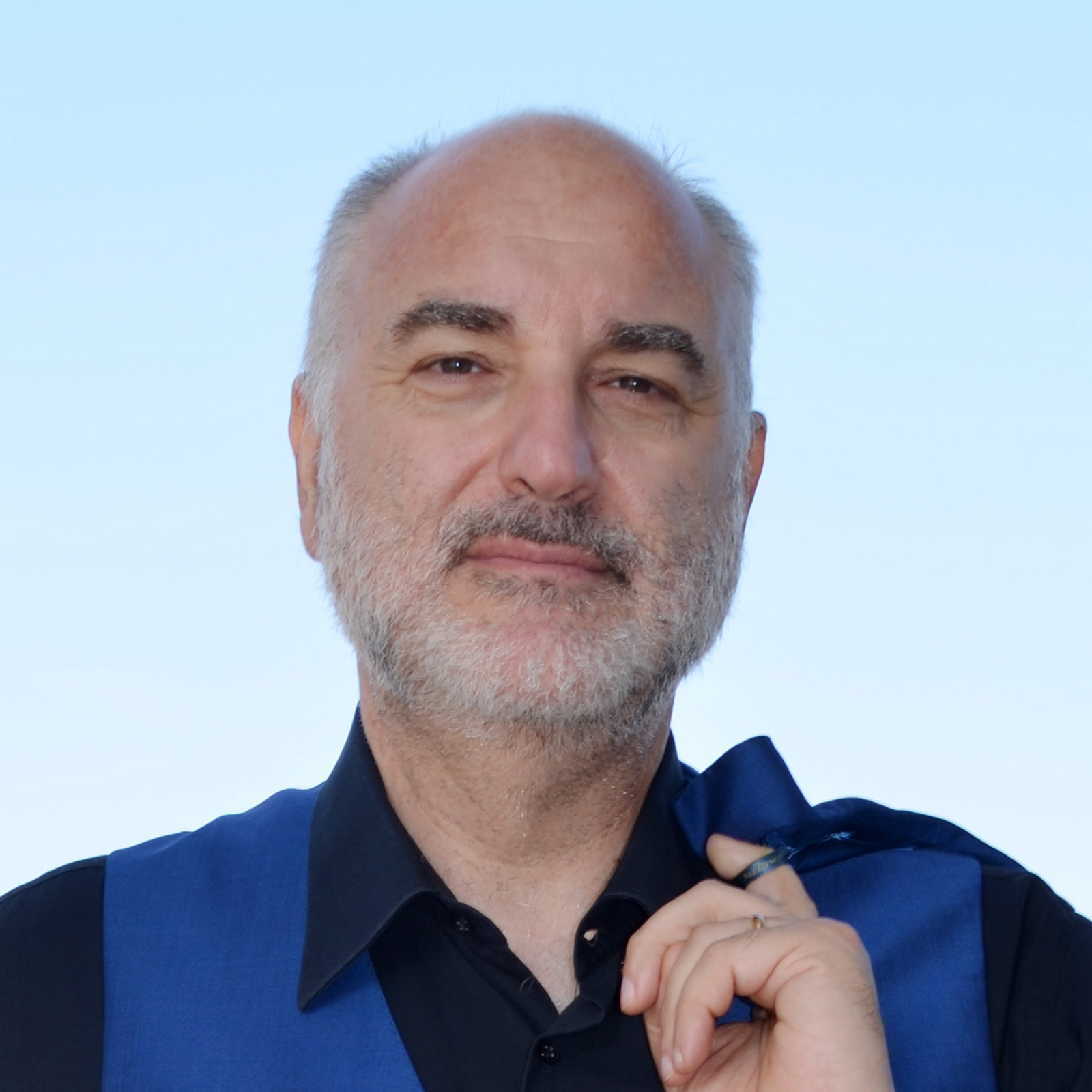Symphony Concert N° 6
In commemoration of Dresden's destruction on February 13, 1945
Mitwirkende
- Daniele Gatti Conductor
- Eleonora Buratto Soprano
- Szilvia Vörös Mezzo-Soprano
- Francesco Meli Tenor
- Michele Pertusi Bass
- State Opera Chorus Dresden
gespielte Werke
Giuseppe Verdi
- »Messa da Requiem«
When Rossini died in 1868, Verdi suggested that Italy’s leading composers join forces to write a funeral mass. He himself contributed the concluding »Libera me«. However, the project was abandoned shortly before the premiere. Five years later, Verdi decided to write his own requiem, into which he incorporated the existing material. This work was not written for the church, but for the concert hall. Powerful emotions and dramatic contrasts combine to create a stream of deeply felt music that underscores the urgent message of the sacred texts: humility in the face of death and the hope of salvation to be gained through supplication.
- Wednesday12.2.2519:00 UhrSemperoper
- Thursday13.2.2519:00 UhrSemperoper
Duration approx. 100 min
Daniele Gatti
Daniele Gatti has been Principal Conductor of the Staatskapelle Dresden since the 2024/2025 season. He made his debut with the orchestra in February 2000 at the invitation of the then Principal Conductor, Giuseppe Sinopoli, with a programme featuring works by Mendelssohn, Hindemith and Brahms. Over the following years, the Italian maestro returned several times to Dresden. Gatti’s mastery of the Staatskapelle’s core repertoire, his visionary interpretations and keen sense of the sound and unique traditions of this historic ensemble are an assurance of outstanding concert experiences. In his second season, he continues the Staatskapelle’s first complete Mahler cycle with the »Vienna Years«.
In addition to his post in Dresden, Daniele Gatti is also Chief Conductor of the Teatro del Maggio Musicale Fiorentino, Music Director of the Orchestra Mozart and, since 2016, Artistic Advisor to the Mahler Chamber Orchestra. In the same year, he took up a teaching post at the Accademia Musicale Chigiana in Siena.
Born in Milan in 1961, Gatti studied composition and orchestra conducting at the Conservatorio Giuseppe Verdi in his home city. He made his debut at La Scala at the age of 27. This was followed by permanent engagements with leading music institutions such as the Accademia Nazionale di Santa Cecilia, London’s Royal Opera House, the Royal Philharmonic Orchestra and the Teatro Comunale di Bologna. He was subsequently Principal Conductor of the Orchestre National de France (2008-2016), the Zurich Opera House (2009-2012) and the Royal Concertgebouw Orchestra in Amsterdam (2016-2018), as well as Music Director of the Teatro dell’Opera di Roma until 2022. Gatti is also a popular guest conductor, appearing for example with the Berlin Philharmonic, the Vienna Philharmonic, the Bavarian Radio Symphony Orchestra and the Orchestra Filarmonica della Scala.
Equally in demand in the field of opera, Daniele Gatti has conducted major new productions such as Robert Carsen’s staging of »Falstaff« in London, Milan and Amsterdam, »Parsifal«, staged by Stefan Herheim, which opened the Bayreuth Festival in 2008, as well as a production of the same opera by François Girard at New York’s Metropolitan Opera and four operas at the Salzburg Festival: Richard Strauss’s »Elektra«, Puccini’s »La bohème«, Wagner’s »Die Meistersinger von Nürnberg« and Verdi’s »Il trovatore«.
In 2008, he conducted »Don Carlo« to open the new season at Milan’s La Scala as well as »Lohengrin«, »Lulu«, »Die Meistersinger von Nürnberg«, »Falstaff« and »Wozzeck«. As part of Verdi’s birthday celebrations in 2013, he conducted »La traviata«, again launching the new season at La Scala.
He has opened several seasons of the Teatro dell’Opera di Roma with works such as Wagner’s »Tristan und Isolde«, Berlioz’s »La damnation de Faust«, Verdi’s »Rigoletto« and »Les vêpres siciliennes«, Rossini’s »Il barbiere di Siviglia« and the world premiere of Giorgio Battistelli’s »Julius Caesar«. In 2023, he conducted Verdi’s »Falstaff« and all of Tchaikovsky’s symphonies as part of the 85th Maggio Musicale Fiorentino festival.
In 2024, he conducted the opening concerts of the new seasons of both the Staatskapelle Dresden and the Vienna Philharmonic before going on tour with both ensembles through Europe’s music capitals. In summer 2025, he will return to the Bayreuth Festival for the new production of »Die Meistersinger von Nürnberg«.
Daniele Gatti’s extensive discography testifies to his broad repertoire. For Sony Classical, he has recorded works by Debussy and Stravinsky with the Orchestre National de France as well as a DVD of Wagner’s »Parsifal«, performed at New York’s Metropolitan Opera. As part of the »RCO Live« series, he conducted the Royal Concertgebouw Orchestra in recordings of Berlioz’s »Symphonie fantastique«, several Mahler symphonies, a DVD of Stravinsky’s »Le sacre du printemps« also featuring Debussy’s »Prélude à l’après-midi d’un faune« and »La mer«, a DVD of Strauss’s »Salome« at the Dutch National Opera and a CD of Bruckner’s Symphony No. 9 paired with the Prelude and »Karfreitagszauber« from Wagner’s »Parsifal«. In 2019, C-Major released a DVD of Wagner’s »Tristan und Isolde« under the baton of Daniele Gatti, staged at the Teatro dell’Opera di Roma.
Daniele Gatti is a three-time winner of the »Franco Abbiati« Prize as Best Conductor, chosen by Italy’s music critics, and in 2016 was named Chevalier de la Légion d’Honneur by the French Republic for his work as Music Director of the Orchestre National de France. He also holds the Order of Merit of the Italian Republic.
Eleonora Buratto
Eleonora Buratto is one of the most highly acclaimed lyric sopranos in the world. She began her career in 2009 singing as Creusa in Demofoonte conducted by Riccardo Muti, under whose baton she then sang in I Due Figaro by Mercadante, Don Pasquale, Simon Boccanegra, Falstaff, Nozze di Figaro, Così fan tutte and Aida. At the start of 2015 she was Corinna at the Dutch National Opera in Amsterdam in Il Viaggio a Reims after which her international career continued to develop. Her current repertoire comprises signature roles such as Mimì, Liù, Micaela, Contessa di Almaviva, Donna Anna, Luisa Miller, Elettra (Idomeneo), Elvira (Ernani); she has collaborated with conductors such as Currentzis, Mehta, Mariotti, Dudamel, Pappano, Gatti, Chailly and Nézet-Séguin. Among her most recent debuts: Fiordiligi, Anaï, Desdemona in Verdi's and Rossini's Otello, Anna Bolena, Madama Butterfly, Elisabetta in Don Carlo and Antonia in Les contes d’Hoffmann. Recent and upcoming engagements include Madama Butterfly at the Teatro dell’Opera di Roma, Desdemona at the Bayerische Staatsoper, her debuts as Suor Angelica at the Wiener Staatsoper and Maria Stuarda at the Palau de les Arts in Valencia and the New Year Concert at La Fenice. In 2022 she was awarded the Abbiati Prize by the Italian Association of Music Critics.
Szilvia Vörös
Die ungarische Mezzosopranistin Szilvia Vörös, die aus einer Musikerfamilie stammt, studierte an der Franz-Liszt-Musikakademie in Budapest bei Éva Marton. Sie gewann mehrere wichtige Gesangswettbewerbe, darunter die Éva Marton International Singing Competion 2014 in Budapest und den Concorso Lirico Internazionale di Portofino 2017. Sie war vier Spielzeiten lang Solistin der Ungarischen Staatsoper, wo sie sich ein breites Repertoire erarbeitete und mit ihren Auftritten als Suzuki (»Madama Butterfly«), Fenena (»Nabucco«), Waltraute (»Die Walküre«), Bersi (»Andrea Chénier«), Romeo (»I Capuleti e i Montecchi«) und Isabella (»L’italiana in Algeri«) große Anerkennung fand.
Ferner wirkte Szilvia Vörös in Peter Eötvös’ Kammeroper »Out at S.E.A.« mit. Mit diesem Projekt trat sie in Mailand, Brüssel, Krakau und Paris auf. Sie wird regelmäßig zu Liederabenden eingeladen und verfügt über ein umfangreiches Konzertrepertoire, das von Bach und Pergolesi über Mozart, Rossini und Liszt bis hin zu Arvo Pärt reicht. Als Teilnehmerin des Young Singers’ Project sang Szilvia Vörös 2016 bei den Salzburger Festspielen mit Placido Domingo die Rolle der Albine in »Thaïs« von Massenet und an der Seite von Anna Netrebko in »Manon Lescaut« von Puccini.
Seit der Saison 2018/2019 ist sie Mitglied des Ensembles der Wiener Staatsoper, wo sie als Anna in »Les Troyens« an der Seite von Joyce DiDonato, in »Rusalka«, als Fenena in »Nabucco«, als Hippolyta (»A Midsummer Night’s Dream«), Ottavia (»L’incoronazione di Poppea«), Mercedes (»Carmen«), Smeton (»Anna Bolena«), Waltraute (»Götterdämmerung«) und Messaggera sowie Prosepina (Monteverdis »L’Orfeo«) debütierte. 2019 trat sie im Brüsseler La Monnaie als Laura in »La Gioconda« und ein Jahr später als Judith in Bartóks »Herzog Blaubarts Burg« mit dem Helsinki Philharmonic Orchestra unter Susanna Mälkki auf. Die zuletzt erwähnte Inszenierung wurde von BIS Records aufgezeichnet; das Album wurde 2022 in der Kategorie »Beste Opernaufnahme« für den Grammy nominiert.
In den letzten Spielzeiten feierte Szilvia Vörös große Erfolge als Judith in »Herzog Blaubarts Burg« unter Michele Mariotti in Rom 2023 und erneut unter Alain Altinoglu in Helsinki 2024, als Waltraute in »Götterdämmerung« an der Wiener Staatsoper, in Verdis »Messa da Requiem« unter James Conlon beim Festival Verdi in Parma 2024 und als Preziosilla in »La forza del destino« unter Nicola Luisotti.
Francesco Meli
Francesco Meli was born in Genoa in 1980 and began his singing studies at 17, continuing with Vittorio Terranova and winning immediately several Competitions. In 2002 he made his operatic debuts at the Festival dei Due Mondi in Spoleto, beginning a career that, in the main Belcanto and Rossini roles, brought him immediately in the main Italian and European Houses : since 2005 he has opened new productions for Rossini Opera Festival, Théatre des Champs-Elysées in Paris, then Genova, Turin, Bologna, Venice, and making debuts in Zurich, Vienna, Covent Garden, Lyon, as well as on record with Virgin.
In 2003 he made his La Scala debut in Les Dialogues des Carmelites conducted by Maestro Riccardo Muti and has returned there over the years to perform in Otello, Idomeneo, Don Giovanni, Maria Stuarda, Der Rosenkavalier, Carmen, Giovanna d’Arco, I due Foscari, Don Carlo, La traviata, Ernani, Tosca, Il Trovatore, Aida, L’elisir d’amore, Macbeth, Un ballo in Maschera and Don Carlo, opening for 6 times the Season of the House.
Since 2009 he has gradually turned his attention from Bel canto roles towards dramatic opera, singing I Lombardi alla Prima Crociata, Simon Boccanegra, Werther, Un ballo in maschera in Houses like Parma, Rome, the Arena in Verona, La Fenice, Amsterdam, Los Angeles : after his debut in Il Trovatore at La Fenice he sang it in new productions in Salzburg, Covent Garden, Amsterdam, Tokyo and Monte Carlo. He then sang notably I due Foscari in Covent Garden and at La Scala, Giovanna d’Arco in Salzburg and at La Scala : since 2013, the 200th anniversary of Verdi’s birth, he sang in Simon Boccanegra, I due Foscari, Ernani and in Nabucco at the Rome Opera and in Salzburg under Riccardo Muti, Ernani at the MET, Macbeth, Aida and Un ballo in Maschera conducted by Riccardo Muti with Chicago Symphony Orchestra, Simon Boccanegra in Vienna and at La Fenice, Aida at the Salzburg Festival conducted by Riccardo Muti and in new productions in Dresden and Covent Garden. Francesco Meli has a repertoire of over fifty roles and has performed under the world’s most eminent conductors, working regularly with Riccardo Chailly, Myung-Whun Chung, Fabio Luisi, Zubin Mehta, Riccardo Muti, Gianandrea Noseda, Antonio Pappano, Daniele Rustioni, Christian Thielemann and Yuri Temirkanov. He has performed in solo recitals at La Scala and in London, Tokyo and St. Petersburg and in the Verdi Requiem with Riccardo Chailly, Daniele Gatti, Fabio Luisi, Zubin Mehta, Riccardo Muti, Lorin Maazel, Gianandrea Noseda and Yuri Temirkanov at La Scala and in Baden-Baden, London, Dresden, Munich, Paris, Florence, Zurich, Moscow, Salzburg, St. Petersburg, Tokyo and Vienna.
In November 2021 he realeased “Prima Verdi”, his first album devoted to a single composer, by Warner. His recordings are available on a range of DVDs released by Deutsche Grammophon, Unitel and Opus Arte.
He is artistic director and one of the tutors at the Academy of Advanced Professional Training for opera singers at Genoa’s Teatro Carlo Felice.
Michele Pertusi
Acclaimed as one of the greatest singers in the present world lyric scene, Michele Pertusi was born in Parma, where he studied piano and singing at the Conservatory “A. Boito”. Then he continued his studies with Arrigo Pola, Carlo Bergonzi and Rodolfo Celletti.
In February 2005 he won the Grammy Award for the Best Opera Recording in the title role of Verdi’s Falstaff,with the London Symphony conducted by Sir Colin Davis (LSO LIVE). In 1995 he was awarded the “Abbiati International Prize”. His recording of Il turco in Italia conducted by Riccardo Chailly for Decca was awarded the Gramophone Award. He has also been the recipient of the Golden Medal as Cultural Benemeritus by the President of the Italian Republic. In 2018 he was awarded the prestigious “Rodolfo Celletti” prize at Festival della Valle d’Itria in Martina Franca.
He collaborated with most of the world leading conductors, including Riccardo Muti, Carlo Maria Giulini, Zubin Metha, Georg Solti, Daniel Barenboim, James Levine, Kazushi Ono, Myung-Whun Chung and Antonio Pappano and he has appeared at the most important opera houses, concert houses and festivals all over the world.
In recent years Michele Pertusi has established himself as a outstanding interpreter of Verdi’s roles such as Filippo II in Don Carlo (Vienna State Opera, Teatro Real Madrid, Festival Verdi, La Scala), Attila (La Scala, La Fenice Venice, Festival Verdi, Opéra de Liege), Pagano in I Lombardi alla prima crociata (Parma, Monte-Carlo), Sparafucile in Rigoletto (Festival Verdi, Vienna), Fiesco in Simon Boccanegra (Vienna, Turin, Parma), Padre Guardiano in La forza del destino (Opéra Royal de Wallonie de Liège), Conte Walter in Luisa Miller (Bayerische Staatsoper Munich, Opera di Roma), Da Silva in Ernani (La Scala), Massimiliano in I masnadieri (La Scala, Valencia), Zaccaria in Nabucco (Festival Verdi, Arena di Verona), Banco in Macbeth (Festival Verdi), Procida in Les vêpres siciliennes (Opera di Roma), Ramfis in Aida (Arena di Verona), and Messa da Requiem under the baton, among others, of Riccardo Chailly, Zubin Metha, Myung-Whun Chung, Daniele Gatti.
Refined and outstanding interpreter of Rossini’s roles, Michele Pertusi is a regular guest of Rossini Opera Festival in Pesaro, where he made his debut in 1992 as Assur in Semiramide, followed by Moïse et Pharaon, Maometto II, Guillaume Tell, Il viaggio a Reims, Le siège de Corinthe, Torvaldo e Dorliska, La gazza ladra and Il barbiere di Siviglia. For his achievements at ROF, he was awarded the “Rossini d’oro” Prize.
His discography includes, among others, Rossini’s Petite Messe Solennelle, Stabat Mater, Cantata per Pio IX and La Cenerentola conducted by Riccardo Chailly (Decca), Don Giovanni and Così fan tutte conducted by Georg Solti (Decca), Le nozze di Figaro under Zubin Mehta’s baton (Sony), Semiramide and Maometto II (Ricordi), Don Giovanni conducted by Daniel Barenboim (Erato), La damnation deFaust and Falstaff conducted by Colin Davis (LSO live).
Recent highlights are Rossini's Petite Messe Solennelle with Daniele Gatti at Teatro alla Scala, Simon Boccanegra at Teatro dell’Opera di Roma with Michele Mariotti and in concert at Teatro San Carlo di Napoli, Macbeth (French version) at Festival Verdi Parma, Turandot at Teatro La Fenice Venice and at La Monnaie Brussels, Il barbiere di Siviglia at Rossini Opera Festival Pesaro, Verdi’s Messa da Requiem at Salzburg Easter Festival with Antonio Pappano and Accademia di Santa Cecilia Orchestra, Guglielmo Tell and Don Carlo, season opening conducted by Riccardo Chailly, at Teatro alla Scala Milan.
Next project for 2025 are La forza del destino at Opéra de Lyon, Verdi’s Messa da Requiem at Maggio Musicale Fiorentino with Zubin Mehta, Attila at Teatro La Fenice Venice, Norma at Teatro alla Scala, Turandot at Puccini Festival.
State Opera Chorus Dresden
Had it not been for Carl Maria von Weber, Dresden’s opera chorus would not have been founded, or at least not on October 8, 1817. It was Weber who obtained royal approval for this initiative; after all, it was his artistic mission (and personal ambition) to establish a German opera company alongside the tradition-steeped Italian opera. Besides suggesting other reforms for the staging of opera, he argued that it was now essential to have a regular choir. The choir started to participate in the traditional Palm Sunday concerts as early as 1827. Major landmarks in its history include the performances in 1846, 1847 and 1849 of Ludwig van Beethoven’s Ninth Symphony under the later Kapellmeister Richard Wagner, who was forced to flee Dresden shortly after the last-mentioned performance.
Currently comprising 89 singers, the Dresden State Opera Chorus has now become one of Europe’s finest opera choruses and has been acclaimed as such in virtually every premiere review in recent years. This preservation of tradition, coupled with a growing awareness of quality, is indebted to such artists as Joseph Metzner, Wilhelm Fischer, Karl Maria Pembaur, Ernst Hintze, Gerhart Wüstner, Franz Peter Müller-Sybel, Hans-Dieter Pflüger, Matthias Brauer and Pablo Assante, who have led the choir through difficult times to the present day. The Dresden State Opera Chorus is currently directed by Jörn Hinnerk Andresen, who since assuming his post in 2014 has maintained and developed such qualities as tonal coherence, refinement and reliably consistent precision.
